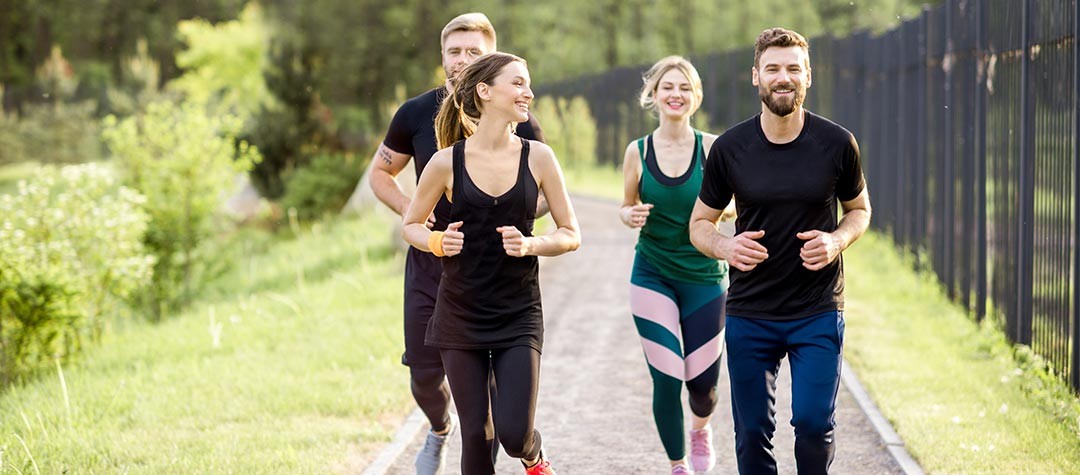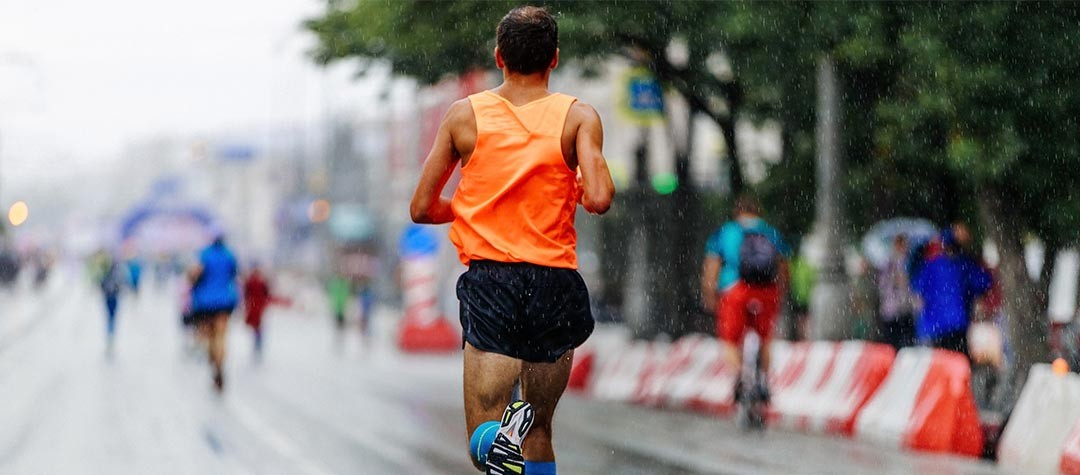Got too many running excuses and reasons not to get out running? Here we dismiss the most common running excuses.
'I'm too self-conscious to run'
Feeling embarrassed can have a crippling effect on anyone, not just runners. Try not to worry about what others think. You should be proud of the fact that you abandoned the TV and decided to be active. Chances are, if anyone does look at you while you are running, it's probably more in admiration for the fact you are actually out there running. Always remember, no matter how slow you go, you are still lapping everyone on the couch.
If you don’t feel confident running alone, try running with a friend. A partner is not only good from a safety point of view, but will also help you feel more at ease with running in public.If being too self-conscious is still an issue, then going out running before most people are up, is a good way of reducing the number of people that potentially might see you running. Morning exercise is also far easier to stick with because it means you get you run in before the demands of the day get in the way.
If you really feel unable to run in public, then there's always the option of a treadmill. It is possible to buy one for home use, if you consider running in the gym is a step too far.
Create a feel of anonymity when you are running outdoors by wearing plain running gear. When running alone in summer, put on a pair of sports sunglasses, and in winter, a wooly hat and darkness can help disguise your frame. For the larger busted woman a good supportive sports bra and crop top are a good way to avoid attracting unwanted attention.
‘I’m too busy to run’
Finding time to run is not always easy, but by putting aside dedicated time, it can become as much of a habit as cleaning your teeth. Running is much more convenient than other forms of exercise in that you can just put on your trainers and go. There's no need to buy lots of expensive equipment or even have to book a session in advance, like you might do with other activities.
For a ten-stone (140lbs) woman, even just 20 minutes jogging burns around 250 calories.
Put simply, in the time it takes to get to the gym, get changed, queue for the machines, get changed again and go home, you could have completed your run and been showered. For a ten-stone (140lbs) woman, even just 20 minutes jogging burns around 250 calories. If a long run after a hard day is just too much too much to face, try dividing the run up between a morning session, and an evening session, and if you really fancy spreading the sessions out, you could try squeezing a run in during your lunch break.
'Running is boring'
How can going out running and getting away from everything be boring? Running offers a great opportunity to have time to think, or simply switch off. Yes, running can become boring if you stick to the same route and same kind of session week after week, so make sure you vary your runs.
Keep your running varied, fun and progressively challenging.Try designing some new running routes using a route planner or try hitting the trails as part of your running regime. Trail running can provide a challenging change of scenery, and a literal breath of fresh air. You could also sign up for some local races, or running clubs to meet fellow runners who can help keep you motivated. You could also find a running partner to inject some fun into your running sessions and help stave off boredom.
‘I’m not the competitive type’
Of course, running can be competitive, but many runners never take part in a race. Often the only person you need to be competitive with is yourself. It's possible that after running for a while you might get the bug and then choose to enter a race, but that is purely a personal choice.
One option for people who like running but don't want to get too engrossed in competition is orienteering. This involves navigating your way around a set course, finding hidden 'controls' along the way by using clues and map reading skills. It’s a good way of going on a run with an added element of fun and not too serious competition – although some people do, of course, take it quite seriously, but you don't have to.
‘I’m too heavy to run’
Being overweight does not mean you cannot take up running. Running is one of the best ways to improve your fitness and achieve a healthy weight, provided you take things steadily. To lessen the risks, following these running tips for beginners:
- Wear good running shoes (proper running shoes from a specialist running store).
- Cross-train (mix running with other lower impact activities such as swimming or cycling to give your muscles and joints a break).
- Run on softer surfaces (grass, trail or treadmill help reduce the impact on joints).
- Mix walking and running (to avoid overdoing it, and to allow you to go for longer and to give yourself ample recovery).
For those who are significantly overweight, it might be best before running to start with an activity like walking, swimming or cycling, which put less stress on the joints, until you have lost some weight. Make sure you discuss your intention to get fit with your doctor first. Take heart from the fact that fit, overweight people are better off than skinny, unfit people when it comes to the likelihood of an early death.
'Running is bad for your knees’
Running is often accused of being bad for your knees. However, research from Stanford University, suggests that regular long-term runners are 25 per cent less likely to suffer from osteoarthritis than sedentary people. Running is thought to help protect against osteoarthritis by keeping joints and connective tissue strong, mobile and topped up with nutrients.
Regular long-term runners are 25 per cent less likely to suffer from osteoarthritis than sedentary people.
Provided you don't have existing problems in your joints, running in moderation does not increase the risk of, or accelerate the development of, osteoarthritis. The Stanford study also found that regular runners had greater bone density, reducing the risk of osteoporosis and frailty later in life.
‘I’m too old to run’
Unless you have a degenerative joint or bone condition (such as osteoarthritis or osteoporosis), are seriously overweight or have a heart, lung or other serious health problem, there isn’t any reason why you can’t start running. Jenny Wood-Allen took up running at 71 and completed over 30 marathons before she finally retired.
It's possible, the older you are, that you may need need to take more rest days, run fewer miles and pay more attention to warming-up, cooling-down and stretching properly, but age should not be a bar to to you running. A study of healthy 60-70 year olds found that running for 45 minutes, four days per week, increased aerobic fitness by a massive 24 per cent in under a year.
‘I’m too tired to run’
After a hard day’s work it’s hard to see past the oasis of your couch. But did you know that going for a run can actually invigorate you and leave you feeling energised. If you’re feeling sluggish it may be due to low blood sugar levels, so eat a snack or a light meal about at least an hour before you usually run and see how you feel. If trying to run at different times before you are tired out by your work day, such as early in the morning or lunchtime, doesn’t work for you, then if you’re still feeling tired at the start of your run, there’s no shame in setting off at a walk. You can slowly build up to a run along your route.
‘I’m not seeing any results’
Visible results might not be immediate, but what you can be sure of, is the fact that the great cardiovascular workout that runners enjoy allow your lungs and heart to get stronger with each session. Bare in mind that your times should improve before any of the aesthetic benefits of your running reveal themselves. Exterior physical results, such as fat loss and toning, will naturally take longer to show, but they will come.
With all this in mind, what's really stopping you running? The only things stopping you is yourself, so start running today.
Picture credit: DarioZg / Shutterstock.com














